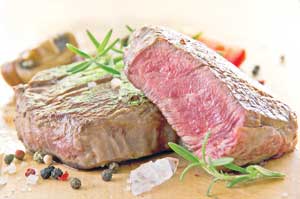
The foot and mouth disease outbreak brings along with it some unintended consequences, such as people shunning meat or hesitating about whether they should consume any animal produce or not. To eat or not to eat, that is the question of the moment.
It is a nightmare come true for meateaters who generally smirk at the sight of vegetables. The foot and mouth disease has created something of a collective psychosis where people are seriously questioning their eating habits. So much for the waistlines, but what are the options available?
Before you embark on a life changing course, and irreversibly alter your diet, it is good to know that there are currently no scientific studies showing that eating meat from an infected animal has a repercussion on human health. Add a pinch of salt to that... Meat or chicken, apart from the taste, are only a source of proteins, bear that in mind. Proteins are even found in broccoli or soy beans.
As more and more people are hesitant to consume meat or chicken, nutritionist Divya Poorun provides a simple nutritional replacement. “Both meat and chicken are rich in protein. The human body needs sufficient amounts of protein every day. For instance, a normal person weighing 60 kg needs 60 grams of protein per day. Now, if a person does not want to eat chicken or meat, it can be replaced by other sources of protein such as milk, soya, cheese or lentils.”
The nutritionist explains that lentils provides a very low amount of protein in the body. “In order to get the adequate amount of protein, a person should mix various lentils together or mix lentils with rice or whole wheat. There is also a new product called Quinoa available on the market. It is costly but it is a good source of protein.”
According to the nutritionist, our dreadful fright of not being able to eat meat or chicken only happens in our head. “The body needs is protein and once it gets the required amount, nothing else matters. People tend to believe that it is impossible to live without chicken or meat but this is not the case. If a person is experiencing difficulties to eat protein from plants, he has to just make it tastier by adding more seasoning.” Let that sink in should you avoid meat, as the disease is showing no signs of abatement.
2,547 animals slaughtered
A new case of FMD was detected in Terre-Rouge on Thursday. Other areas in Mauritius hit by this disease are La Cure, Vallée des Prêtres and Highlands. As on 14 August, 644 animals were slaughtered in Mauritius. Suspect cases were reported in Highlands and Notre Dame. After analysis, it was found that three animals had contracted the virus. Decision was taken to kill all three along with another 39 animals who were in the same herd. As for Rodrigues, the whole island is quarantined, except Delo Vert, St. Gabriel, Baie Topaze and Ile-aux-Crabes. This Sunday 21 August, 30,000 doses of vaccines ordered from the Botswana will arrive in the country.
“An epidemic in Rodrigues”
The Assistant Director Livestock and Veterinary Division of the Ministry of Agro-Industry Dr Deodass Meenowa explains that the foot and mouth disease cannot be qualified as an epidemic. “In Mauritius, we can speak in terms of outbreak or single occurrences, as we are doing our best to handle the situation. However, the foot and mouth disease can definitely be qualified as an epidemic in Rodrigues, as many animals have been affected.”
Eid ul Adha festival: Animals sacrifice not permitted in Vallée des Pretres
Inhabitants of Vallée des Pretres, one of the most affected areas in Mauritius by the foot and mouth disease (FMD), will not be allowed to carry out the sacrifice of animals at their home for the Eid ul Adha festival. This decision was announced on Thursday in a meeting between the Minister of Agro-Industry Mahen Seeruttun and representatives of the Jummah Mosque in a bid to prevent any spread of the outbreak of FMD.
Celebrated on 12 September, the inhabitants of Vallée des Pretres will have to proceed to the ‘Sacrificial Feast’ at the slaughterhouse of the Mauritius Meat Authority (MMA) in Roches Bois. Nissar Ramtoola, president of the Jummah Mosque proposes that all animals should obtain a health certificate in regards to the Eid ul Adha celebrations. He appeals to the assistance of the authorities during this religious holiday and also appeals to the responsibility of everyone.
 Dr Meenowa says that four species of domesticated animals, namely sheep, goat, pork and beef are vulnerable to the disease. “We have noticed that the disease has spread to other animals in Rodrigues, especially in farms where different livestocks are bred together. This is why we are appealing to all farmers in Rodrigues as well as in Mauritius.”
Dr Meenowa says that four species of domesticated animals, namely sheep, goat, pork and beef are vulnerable to the disease. “We have noticed that the disease has spread to other animals in Rodrigues, especially in farms where different livestocks are bred together. This is why we are appealing to all farmers in Rodrigues as well as in Mauritius.”
Speaking of the spread of the disease to other species, Dr Meenowa said that there are few chances that the disease will affect poultry, horses or even dogs. However, he underlines that if other species such as chickens come into contact with infected cattle or if they are bred in the same farm, the chicken can serve as vectors of the virus. He states they are unaware whether farming and slaughtering of poultry is done according to sanitary norms in Rodrigues. “I believe that an enquiry must be initiated in this regards,” he trusts.
What can be the probable causes of the outbreak of the foot and mouth disease? Dr Meenowa states that an investigation is ongoing, however, according to sources, the disease might have been introduced by illegal import of cattle.
 J'aime
J'aime














